Srebrenica: Victims’ 21-years-long search for the truth and its acknowledgement
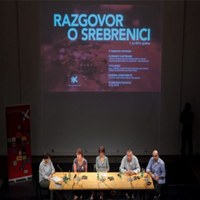
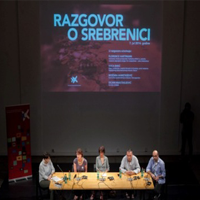 On the occasion of marking the 21st anniversary of the Srebrenica genocide, the Humanitarian Law Center (HLC) organized a debate dedicated to the victims of the Srebrenica genocide. The panellists Nidžara Ahmetašević, Ivica Đikić, Florence Hartmann and Dejan Anastasijević discussed before a hall full of people at the Centre for Cultural Decontamination, the responsibility for the killing of several thousands of people in and around Srebrenica during July 1995, and the years’ long struggles of victims of this crime for the truth and its acknowledgement.
On the occasion of marking the 21st anniversary of the Srebrenica genocide, the Humanitarian Law Center (HLC) organized a debate dedicated to the victims of the Srebrenica genocide. The panellists Nidžara Ahmetašević, Ivica Đikić, Florence Hartmann and Dejan Anastasijević discussed before a hall full of people at the Centre for Cultural Decontamination, the responsibility for the killing of several thousands of people in and around Srebrenica during July 1995, and the years’ long struggles of victims of this crime for the truth and its acknowledgement.






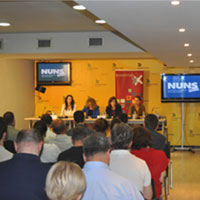
 The Humanitarian Law Center (HLC) presented its triennial report “
The Humanitarian Law Center (HLC) presented its triennial report “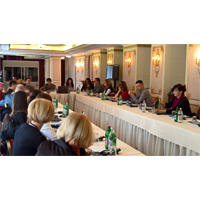
 The Humanitarian Law Center (HLC) held a conference entitled “Role of Education in the Reconciliation Process”, on April 20th, 2016, in which history teachers and civic education teachers, representatives of the Ministry of Education, non-governmental organizations and expert members of the public participated. The Conference is a part of the HLC’s education programme “Education for Reconciliation”, which was established in 2012 in the form of a regional and national programme of informal education in dealing with the past. The objective of the Conference was to present two proposals for practical policies in the area of education, which would be focused on research into the needs and models for introducing topics from the field of dealing with the past, transitional justice and reconciliation into university programmes, and which would represent recommendations and models for incorporating judicial facts about the events of the 1990s into history books.
The Humanitarian Law Center (HLC) held a conference entitled “Role of Education in the Reconciliation Process”, on April 20th, 2016, in which history teachers and civic education teachers, representatives of the Ministry of Education, non-governmental organizations and expert members of the public participated. The Conference is a part of the HLC’s education programme “Education for Reconciliation”, which was established in 2012 in the form of a regional and national programme of informal education in dealing with the past. The objective of the Conference was to present two proposals for practical policies in the area of education, which would be focused on research into the needs and models for introducing topics from the field of dealing with the past, transitional justice and reconciliation into university programmes, and which would represent recommendations and models for incorporating judicial facts about the events of the 1990s into history books. 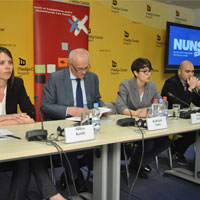
 On April 5th, 2016, the Humanitarian Law Center (HLC) presented its report “
On April 5th, 2016, the Humanitarian Law Center (HLC) presented its report “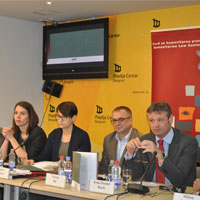
 On Thursday, March 3, 2016, the Humanitarian Law Center (HLC) presented the Report on War Crimes Trials in Serbia in 2014 and 2015, and organised a debate on this occasion. The Report includes an analysis of 27 cases that were conducted before the courts in Serbia, the general findings about the war crimes trials, and an overview of the sociopolitical events that were of importance to the war crimes trials in Serbia in the said period.
On Thursday, March 3, 2016, the Humanitarian Law Center (HLC) presented the Report on War Crimes Trials in Serbia in 2014 and 2015, and organised a debate on this occasion. The Report includes an analysis of 27 cases that were conducted before the courts in Serbia, the general findings about the war crimes trials, and an overview of the sociopolitical events that were of importance to the war crimes trials in Serbia in the said period. 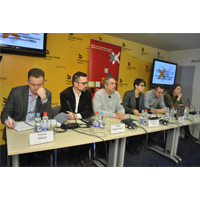
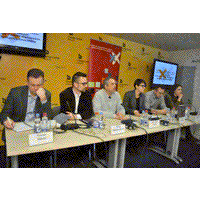 On January 22nd, 2016, the Humanitarian Law Center (HLC) presented the report “Victims’ Right to Reparation in Serbia and the European Court of Human Rights Standards”. The Report sums up the findings about the legal framework and the practice of respect for the right of victims of human rights violations committed during the 1990s to reparation, as evidenced during 2014 and 2015, in relation to the standards of the European Court of Human Rights. Approximately 40 representatives of civil society, victims’ associations, the media, embassies and international organizations participated in the Conference.
On January 22nd, 2016, the Humanitarian Law Center (HLC) presented the report “Victims’ Right to Reparation in Serbia and the European Court of Human Rights Standards”. The Report sums up the findings about the legal framework and the practice of respect for the right of victims of human rights violations committed during the 1990s to reparation, as evidenced during 2014 and 2015, in relation to the standards of the European Court of Human Rights. Approximately 40 representatives of civil society, victims’ associations, the media, embassies and international organizations participated in the Conference.

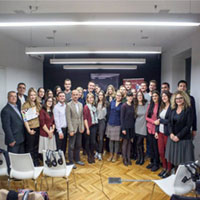
 A debate on the role of education in the process of dealing with the legacy of the violent past was held on October 22nd, 2015, in the Library of the Humanitarian Law Center (HLC). The participants in the debate were Sanja Petrović Todosijević, a historian from the Institute for the Recent History of Serbia, Daša Duhaček, a Professor at the Faculty of Political Sciences in Belgrade, the Deputy Executive Director of the HLC, Marijana Toma, and students of the fourth generation of the Regional School for Transitional Justice. The topics of the debate were the position of the educational system towards past human rights violations, the role of youth in reconciliation processes and non-institutional (informal) platforms for the provision of support to efforts to teach history on the basis of facts that have been established.
A debate on the role of education in the process of dealing with the legacy of the violent past was held on October 22nd, 2015, in the Library of the Humanitarian Law Center (HLC). The participants in the debate were Sanja Petrović Todosijević, a historian from the Institute for the Recent History of Serbia, Daša Duhaček, a Professor at the Faculty of Political Sciences in Belgrade, the Deputy Executive Director of the HLC, Marijana Toma, and students of the fourth generation of the Regional School for Transitional Justice. The topics of the debate were the position of the educational system towards past human rights violations, the role of youth in reconciliation processes and non-institutional (informal) platforms for the provision of support to efforts to teach history on the basis of facts that have been established. 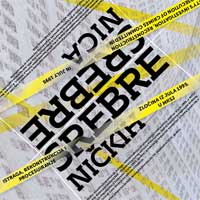
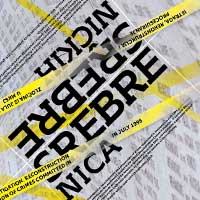 A documentary film entitled “Statement 710399” was shown last night in Belgrade Center for Cultural Decontamination. Following the screening there was a debate on the legacy of the genocide in Srebrenica, the possibilities of building trust and common remembrance, and the importance of court-established facts. Taking part in the debate were the film’s author and former spokesman for the International Criminal Tribunal for the former Yugoslavia (ICTY) Refik Hodzic, director of the SENSE – Center for Transitional Justice Mirko Klarin, a culturalist and activist from Banja Luka Srdjan Susnica, chief editor of the publishing house “Fabrika Knjiga” and columnist of the portal “Pescanik” Dejan Ilic and professor at the Faculty of Law of Union University in Belgrade Vesna Rakic Vodinelic.
A documentary film entitled “Statement 710399” was shown last night in Belgrade Center for Cultural Decontamination. Following the screening there was a debate on the legacy of the genocide in Srebrenica, the possibilities of building trust and common remembrance, and the importance of court-established facts. Taking part in the debate were the film’s author and former spokesman for the International Criminal Tribunal for the former Yugoslavia (ICTY) Refik Hodzic, director of the SENSE – Center for Transitional Justice Mirko Klarin, a culturalist and activist from Banja Luka Srdjan Susnica, chief editor of the publishing house “Fabrika Knjiga” and columnist of the portal “Pescanik” Dejan Ilic and professor at the Faculty of Law of Union University in Belgrade Vesna Rakic Vodinelic.  The „Srebrenica-Culture of Remembrance“ Panel Discussion, organized by the Humanitarian Law Center (HLC) and the Friedrich Naumann Foundation, was held on September 14th, 2015, at the Media Center in Belgrade.
The „Srebrenica-Culture of Remembrance“ Panel Discussion, organized by the Humanitarian Law Center (HLC) and the Friedrich Naumann Foundation, was held on September 14th, 2015, at the Media Center in Belgrade.